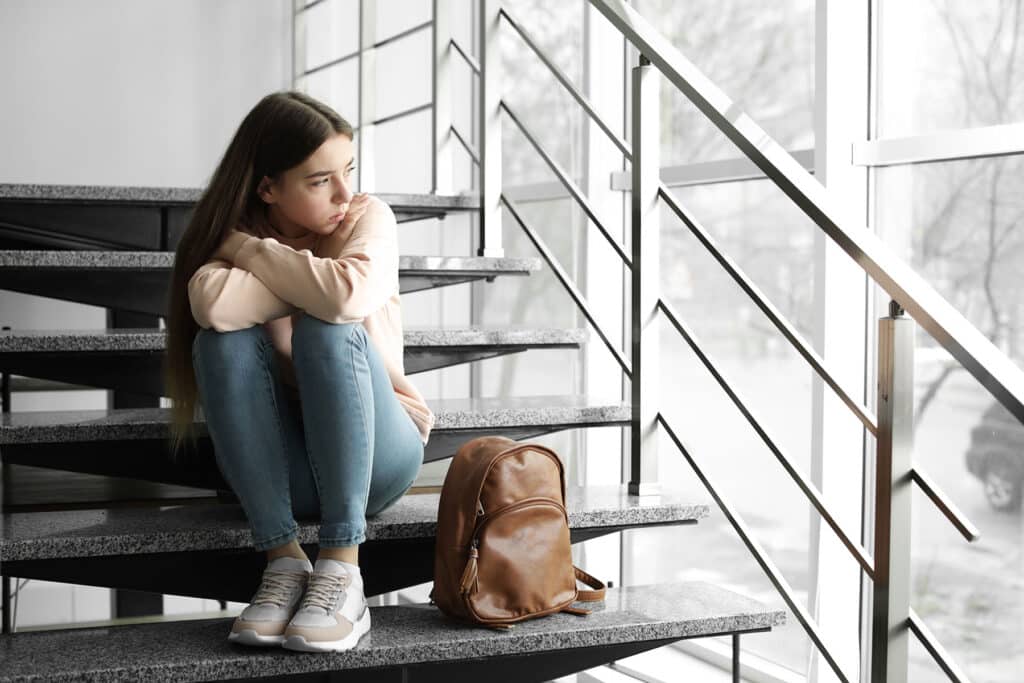Having anxiety is normal. Everyone occasionally suffers from some social anxiety, but struggling with a social anxiety disorder—suffering from a debilitating fear of social situations—is not normal. Social anxiety disorder becomes even more problematic when it leads to developing or worsening a substance use disorder (SUD). Call 888.296.8976 to speak with someone from the knowledgeable team at Northpoint Recovery about social anxiety and substance abuse and our addiction and anxiety treatment programs in Idaho.
About Anxiety Disorders in the United States
According to the Anxiety and Depression Association of America (ADAA), anxiety disorders are the most common mental health condition in the United States.
Common Types of Anxiety Disorders
The most common types of anxiety disorders in the U.S. include the following:
- Generalized anxiety disorder (GAD)
- Social anxiety disorder (SAD)
- Panic disorder
- Obsessive-compulsive disorder (OCD)
About 40 million American adults struggle with anxiety, and the most common manifestation is social anxiety disorder—affecting about 18% of the U.S. population. However, women are twice as likely to struggle with GAD or panic disorder.
Common Symptoms of Anxiety Disorders
There are several recognized types of anxiety disorders with various symptoms:
- Overwhelming feelings of fear, panic, uneasiness, nervousness, or worry
- Loss of concentration or focus
- Dizziness or fainting
- Extreme fear of crowds
- Inability to relax or sit still
- Insomnia and poor rest
- Excessive sweating
- Shortness of breath or hyperventilating
- Accelerated heartbeat
- Chest pain
- Choking sensation
- Nausea and vomiting
- Muscle tension or soreness
Perhaps the best way to describe debilitating anxiety is an intense fear or panic for which there is no real, proportional cause—an actual feeling of imminent mortal danger within a normal social situation.
Co-Occurring Disorders: Social Anxiety and Drug Abuse or Alcoholism
Everyone has their “threshold” limit regarding how much outside stimulus or “stress” they can handle. When that threshold is exceeded, some deal with it using their coping mechanisms. Most dysfunctional behaviors come from the inability to withstand this stress by coping in a healthy manner.
Social anxiety will often cause people to do unhealthy things to ease their discomfort. For example, many people struggling with a social anxiety disorder will try to “self-medicate” with alcohol or drugs to quiet their fears. Unfortunately, that coping method inevitably backfires. Chronic self-medication can increase the risk of dependency, abuse, and addiction without ever addressing the underlying problem—anxiety. And, when their dysfunctional, addicted behaviors inevitably result in new difficulties, the person’s anxiety only worsens. More anxiety leads to more attempts to numb those feelings by drinking or drug use. It is a self-perpetuating downward spiral.
Their equal prevalence indicates the twisted connection between social anxiety and substance abuse—one-third of substance abusers have an anxiety disorder, and one-third of those with anxiety disorders also battle substance abuse.
How Alcohol and Other Depressants Can Affect Social Anxiety
Alcohol, barbiturates, and other depressants, such as benzodiazepines, may appear to ease anxiety. Still, abuse of these substances can cause physical and mental impairment, a significant source of stress. Withdrawal from alcohol and other depressants can also cause worsened anxiety, even to the point of panic attacks. In other words, a person who self-medicates with alcohol, benzodiazepines, or barbiturates can become so dependent on their effects that their anxiety worsens when the substance is absent. “Rebound anxiety” can be so severe as to trigger a relapse into substance abuse.
How Stimulant Drugs Can Affect Social Anxiety
Approximately 40% of amphetamine or methamphetamine users have a lifetime history of anxiety disorders and even more experience anxiety symptoms during intoxication and withdrawal. Likewise, cocaine addiction often co-occurs with anxiety and other psychiatric disorders.
Find Dual Diagnosis Treatment in Idaho at Northpoint Recovery
The most important thing for a person struggling with a dual diagnosis of social anxiety and substance abuse to know is that help is available. It is not necessary to continue to suffer in silence or alone. The best addiction recovery programs understand that co-occurring disorders are common, so they have established therapeutic protocols. To learn more, contact Northpoint Recovery today at 888.296.8976.

